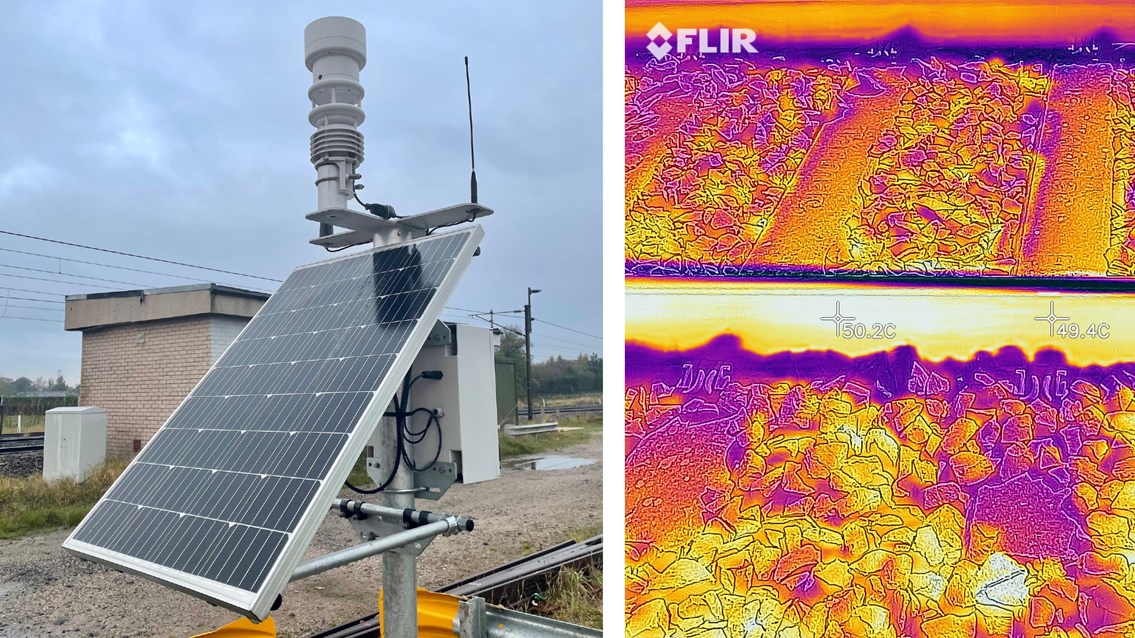Thursday 14 Jul 2022
Travel advice for North West with tracks set to exceed 50°C
- Region & Route:
- North West & Central
- | North West & Central: North West
Rail passengers in the North West are being advised to plan ahead with heatwave conditions expected to impact journeys next week.
The Met Office has issued a red weather warning for extreme heat from Sunday (17 July), with temperatures forecast to reach 35°C in some parts of the region on Monday and Tuesday.
Ahead of this, Network Rail’s extreme weather action teams (EWATs) are preparing all the tools at their disposal to keep passengers and freight safely on the move.
However, the hot weather is likely to cause delays so passengers are being given an early warning to regularly check National Rail Enquiries at www.nationalrail.co.uk before they set off on their journey.
Phil James, Network Rail's North West route director, said: “Keeping passengers moving is always our top priority. But we want people to be prepared. If the soaring temperatures do lead to us having to put in place slower speeds for safety reasons, please bear with us while our engineers work to fix the problem. It may mean some journeys take longer.
“For those who must travel by rail, we’d remind people to carry some water with them so they can stay hydrated, and always check before travelling so they know exactly what to expect.”
The hot weather, particularly direct sunlight, can cause track temperatures to reach more than 50°C.
Steel rails absorb heat easily and tend to hover around 20 degrees above the surrounding air temperature.
When steel becomes very hot it expands and rails can bend, flex and, in serious cases, buckle.
To prevent this from happening some sections of rail are painted white to reflect the sun's rays and stop the steel from getting too hot.
Trains also run at slower speeds to put less strain on the rails.
The network of 25,000 volt overhead electric cables which power trains is also susceptible to high temperatures.
They can cause the steel wires to overheat and then hang too low - getting caught on passing trains and knocking out their electricity supply.
Last year a system of 60 solar-powered weather stations were also installed* to monitor extreme conditions in real-time so railway staff can keep more trains moving instead of imposing region-wide speed limits.
Right now across Network Rail’s North West and Central region they’re being used to predict where the railway teams should be deployed.
By using the new technology, Network Rail engineers are ready to respond to any issues caused by the heatwave and impose speed limits in local areas if they are needed.
Railway staff are ready for this challenge on the West Coast main line between Crewe and Carlisle, on Merseyside, in Greater Manchester, Lancashire and Cumbria.
Passengers are advised to check before they travel at www.nationalrail.co.uk in case trains do need to run more slowly.
For more information on how Network Rail deals with the hot weather visit www.networkrail.co.uk/how-we-prevent-tracks-from-getting-too-hot/.
Notes to Editors
*Weather stations
The £1.3m weather station investment gives staff access to real-time data so response teams can be sent to the right place at the right time to fix the railway rapidly.
Between Euston and Carlisle there are 60 weather stations, with 30 in the North West (14 in Lancs and Cumbria, 10 on Merseyside, 6 in Greater Manchester).
The scientific surveillance stations measure:
- Wind speed & direction
- Wind gust & direction
- Air temperature
- Relative humidity
- Dew point
- Rain fall totals (precipitation rate & accumulation)
In the longer term the data gathered will help Network Rail weather experts to predict which parts of the network are more vulnerable to bad weather before it even hits.
Since 2015 in Network Rail’s North West and Central region, extreme weather has caused half a million minutes of train delays – or more than 400 days.
Contact information
Passengers / community members
Network Rail national helpline
03457 11 41 41
Latest travel advice
Please visit National Rail Enquiries
Journalists
Network Rail press office - North West & Central Region
0330 854 0100
NWCmediarelations@networkrail.co.uk
About Network Rail
We own, operate and develop Britain's railway infrastructure; that's 20,000 miles of track, 30,000 bridges, tunnels and viaducts and the thousands of signals, level crossings and stations. We run 20 of the UK's largest stations while all the others, over 2,500, are run by the country's train operating companies.
Usually, there are almost five million journeys made in the UK and over 600 freight trains run on the network. People depend on Britain's railway for their daily commute, to visit friends and loved ones and to get them home safe every day. Our role is to deliver a safe and reliable railway, so we carefully manage and deliver thousands of projects every year that form part of the multi-billion pound Railway Upgrade Plan, to grow and expand the nation's railway network to respond to the tremendous growth and demand the railway has experienced - a doubling of passenger journeys over the past 20 years.
Follow us on Twitter: @networkrail
Visit our online newsroom: www.networkrailmediacentre.co.uk

